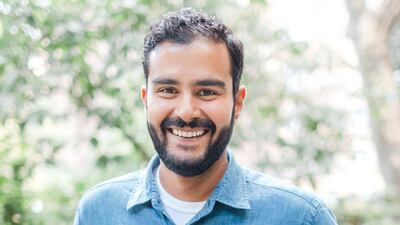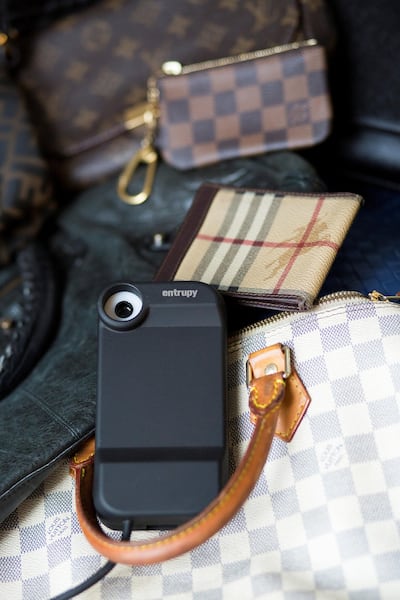Entrupy’s co-founder began the journey to starting his business on a pitch-black night in the middle of a forest in India. On a cross-country trip, his motorcycle had spluttered out at 2.30am in the morning, leaving him stranded and staring at a dead battery – the culprit of his current predicament – in the middle of the night.
Pushing his bike, he knew that yet again he had fallen victim to a counterfeit part. There had been times he realised He had a suspicion his brake cable was better suited to a commuter’s road bike than a motorcycle, as he held the frayed cord in his hands.
“For me, personally and emotionally, the issue was paying for something and not getting what you pay for,” says Vidyuth Srinivasan, co-founder and chief executive of Entrupy.
The New York-headquartered start-up, now eight years old and with more than 600 customers worldwide, uses artificial intelligence and microscopic fingerprinting to detect fake luxury goods – one of the biggest markets for counterfeiting.
The globalisation of trade and the proliferation of e-commerce and social media has offered enormous opportunities for organised criminals to pursue counterfeiting with greater speed and efficacy, the 2018 Global Brand Counterfeiting Report found. Losses to brands due to global online sales of fakes totalled $323 billion (Dh1.2 trillion) in 2017, with luxury brands incurring a loss of $30.3bn through internet sales, according to the report.
Fake goods are a problem because they take away from legitimate businesses and erode consumer trust. Dubai is tackling the issue aggressively. In 2018, counterfeit items worth Dh332 million were seized and destroyed by authorities. Dubai's Department of Economic Development said a total of 19.9 million counterfeit items were confiscated from traders in the emirate last year. There is now evidence its efforts against the problem is working. The value of fake items recovered by authorities is down compared to figures from 2016, when DED recovered goods worth Dh1.6bn.
Last month, Dubai said it would be partnering with Entrupy, adding an element of technology to its arsenal to police marketplaces for counterfeit luxury goods.
DED will be the first government entity in the UAE and wider region to adopt AI solutions to fight counterfeit activities, according to Mohammed Lootah, chief executive of the Commercial Compliance and Consumer Protection in DED.
"We seek to regulate the relationship between the merchant and consumer as it is important to Dubai's reputation as a business hub," said Mr Lootah. "The new technology will make brand owners more confident of their rights being protected in Dubai."
With Entrupy's device – a microscopic camera attached to an iPod – an inspector can detect counterfeit products within minutes. Entrupy claims 99.1 per cent accuracy, a figure that only increases as its customers upload more photographs of products. Each image is added to its database, making its machine learning algorithms "smarter".
Entrupy has more than 100,000 items catalogued as microscopic images, such as leather products, watches, accessories and clothing from brands such as Burberry, Guyard and Hermes. The company plans to add more branded items to its interface in co-ordination with DED by the end of the year.
“Every item authenticated by Entrupy and Entrupy-verified businesses receives a unique certificate that can easily be verified through the website as well as a one-year financial guarantee,” Mr Srinivasan says. “If, for example, a consumer were to purchase an Entrupy-certified item that proves to be a counterfeit, we will refund the amount paid for the item.”
It has been a long road to AI, venture capital investment and hundreds of paying customers from that deserted roadside outside Hyderabad, back in the early 2000s.
Mr Srinivasan was introduced to his co-founder Ashlesh Sharma through mutual friends in 2011. Mr Sharma was in the midst of earning his PhD in computer science at New York University, authoring scholarly articles on detecting fraudulent paperwork using microscopic imaging.
Mr Srinivasan, meanwhile, had cut his teeth designing and developing computer games for Raptor Entertainment and doing public relations and business development for Microsoft and Intuit in India.
By 2014, after a few years of working out of NYU and relying on the university for intellectual property licencing, networking and office space, Mr Sharma moved with his wife to Seattle in Washington and the company became a cross-country effort. Around this time, they added a third co-founder, Lakshmi Subramanian, an associate professor at NYU, who became Entrupy's chief scientist.
In the beginning, the co-founders thought they would court Christie's and Sotheby's to authenticate documents in the rarefied art world.
"We quickly realised, these are amazing industries but can we make a business out of this?" Mr Srinivasan says.
The answer was no.
But it was boom time for the likes of Louis Vuitton, Dior and Chanel, thanks to cultural phenomena such as Sex and the City, Paris Hilton and the Kardashians. The masses were (and still are) demanding luxury fashion.
Before they could pitch clients – mostly secondhand retailers – they needed a vast quantity of data on each item, the particular stitching and leather grain, the logo printing and appearance of typical wear and tear. This amounted to about 500 photos per item.
For a year and a half, the trio turned to their more well-heeled friends to raid their closets and capture microscopic images of Gucci, Chanel and Louis Vuitton products. They pored over coffee table books on the most storied fashion houses and bought bags, wallets and shoes to take photos, then return the items days later.
Entrupy started by offering authentication of the small outrageously popular Louis Vuitton purse – Speedy 25 – that resembles an old-time doctor's bag. It was in high enough demand that secondhand stores and e-commerce websites wanted a way to guarantee they were taking in a legit Louis Vuitton from resellers.
By 2016, Entrupy had some of its first clients. Today, the company has 25 employees spread across New York, Tokyo, Bangalore, Seattle, San Jose and Shanghai. Each new client means a new trove of images to collect and a greater number of brands its device can authenticate.
These days, Mr Srinivasan says he has a pair of Gucci loafers he rarely wears and estimates that three Louis Vuitton card cases have gone missing under his ownership. The purchases are out of an earned respect for purveyors of luxury goods. He and his team have, after all, built a device designed to pick up microscopic aspects of craftsmanship and the finest details of design.
“God knows how long these things will last in my hands,” he says. But he is willing to take the chance.
Q&A with co-founder and chief executive Vidyuth Srinivasan
What was the motivation behind founding Entrupy?
Entrupy was born out of the labs at New York University with one mission: to use the technologies we have available today to solve the age-old counterfeiting problem. Led by a team of technologists and academics, including two PhDs, the company has created the only scale-able solution for the completely objective authentication of physical goods available today.
One thing that you would change if you were to start Entrupy again?
Nothing. We're good as we were.
How important is where you started Entrupy been to the success of your company?
Important, but not critical. It has allowed us the opportunity to grow into a really talented group. But at least 50 per cent of our team is remote, so it is not critical.
Where do you imagine Entrupy five years from now?
Our mission is to be the de facto “Verisign of physical goods” [a US company that certifies the security and of websites] providing the global standard for identifying and authenticating products of all types.
Luxury handbags and accessories are the first step. We are currently developing tools and technologies to serve other areas, protecting other product types where counterfeiting is pervasive as well as offering new layers of protection throughout the supply chain.



